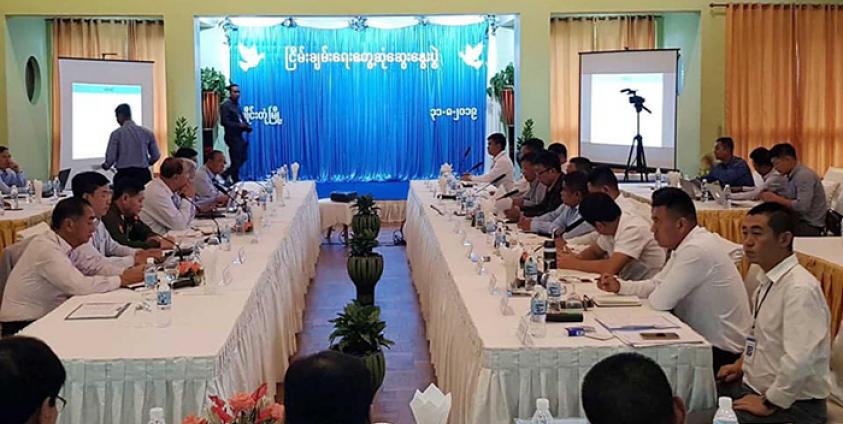The Tatmadaw or Burma Army’s unilateral ceasefire announced on December 12 last year, which has now already been extended a few times until September 21, is actually understood by many as an instrument to pave way for bilateral ceasefire which would cover the Nationwide Ceasefire Agreement (NCA)-non-signatory four-member alliance of National Alliance – Burma (NA-B).
The NA-B is made up of Arakan Army (AA), Kachin Independence Army (KIA), Myanmar National Democratic Alliance Army (MNDAA) and Ta’ang National Liberation Army (TNLA).
But from the outset, the undertaking that excluded the Arakan or Rakhine state or western military region, is doomed to fail as it violates the peace process principle of all-inclusiveness which in turn is also seen a military ploy to annihilate the AA by pacifying its other alliance members to stay out of the conflict.
As a result the war theater in Arakan intensified starting late December last year and continues unabated until today. According to observers armed conflict statistic from December 2018 to August 2019 showed, AA clashed 345 times, MNDAA 25 times and TNLA 65 times with the Tatmadaw.
Looking at it, the intensity of the war in Arakan was tremendously high with nearly 350 times, while the MNDAA and TNLA although relatively low in comparison are within the bounds of unilateral ceasefire area of Shan state, which should be noted. The other included unilateral ceasefire area is Kachin state.
Thus, it is not a wonder that many doubted the sincerity of the Tatmadaw in its peace overtures. When the NA-B met with the government National Reconciliation and Peace Center (NRPC) on August 31, one of its proposition was to include western military region of Arakan in the unilateral ceasefire announcement. However, Tatmadaw’s extension of three weeks unilateral ceasefire on the same day failed to include the Arakan state.
The joint-statement made on August 31 between the NRPC and the NA-B in Kengtung said further meeting will take place on September 16-17, with the meeting venue to be decided at a later date. And the most crucial point has been that the Tatmadaw decision-making level participates in the forth-coming meeting, so that bilateral ceasefire negotiation, which will include demarcation of troops and conditions could be discussed.
Meanwhile, the intensity of the armed conflict goes on northern Shan and Arakan states without any hint of de-escalation, since the Three Brotherhood Alliance (AA,MNDAA and TNLA) offensive attacks on Pyin Oo Lwin and Nawngkhio townships, where some 15 Tatmadaw troops and policemen died with about the same amount wounded.
Presidential Office Director Zaw Htay on August 31 told the media that the Tatmadaw representatives might participate in September 16-17 meeting if the same venue of Kengtung could be agreed upon.
News seeping out from insider sources indicated that the Tatmadaw side cannot agree on the NA-B proposed venue of Panghsang and Kunming. Other than that, the further proposal of the Chinese participation in bilateral ceasefire agreement negotiation and signing the one and same bilateral ceasefire document of the NA-B members together on the same day and date, will be a big challenge or hurdle for the Tatmadaw which won’t be easily overcome.
On top of all these, the opinion on troops stationing position of the NA-B and the Tatmadaw is quite a big difference and the gap is wide and far apart. For example, the Tatmadaw wants the AA to return to Laiza in Kachin state; the TNLA to Palaung self-administrative zone; and the MNDAA to Hong Ai area, according to AA spokesman Khaing Thuka and other AA leaders.
Latest news coming up indicated that Tatmadaw’s suggestion the AA to be stationed in Shan state, instead of Arakan state, where its troops are heavily fighting against the Tatmadaw has been rejected by AA second in command Gen Nyo Tun Aung.
The Three Brotherhood Alliance’s troops stationing position is that all warring parties, which includes the Tatmadaw to stop fighting where they found themselves at the time of bilateral ceasefire.
While bridging the disagreement won’t be a walk in the park, the warring parties are all responsible to deliver to the people they professed to be working for. To this end, there is no other way than to stop the armed conflict by all means and return to the bargaining table, so that the agony of war heaping down on the people will at least be spared.
Agreeing on a bilateral ceasefire should be the first step, which should eventually be followed by an all-inclusive participation in the peace negotiation process, national reconciliation and political settlement.







